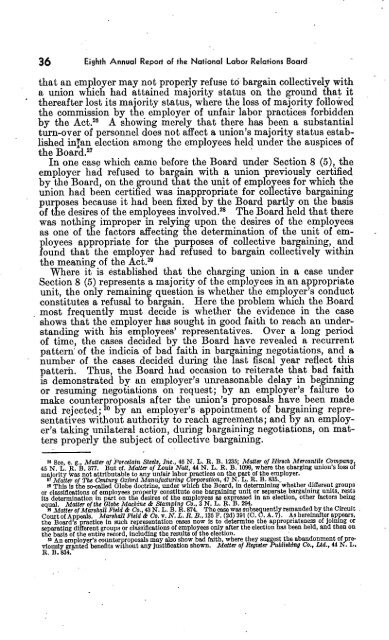1943 - National Labor Relations Board
1943 - National Labor Relations Board
1943 - National Labor Relations Board
Create successful ePaper yourself
Turn your PDF publications into a flip-book with our unique Google optimized e-Paper software.
36 Eighth Annual Report of the <strong>National</strong> <strong>Labor</strong> <strong>Relations</strong> <strong>Board</strong>that an employer may not properly refuse to bargain collectively witha union which had attained majority status on the ground that itthereafter lost its majority status, where the loss of majority followedthe commission by the employer of unfair labor practices forbiddenby the Act." A showing merely that there has been a substantialturn-over of personnel does not affect a union's majority status establishedinlan election among the employees held under the auspices ofthe <strong>Board</strong>."In one case which came before the <strong>Board</strong> under Section 8 (5), theemployer had refused to bargain with a union previously certifiedby the <strong>Board</strong>, on the ground that the unit of employees for which theunion had been certified was inappropriate for collective bargainingpurposes because it had been fixed by the <strong>Board</strong> partly on the basisof the desires of the employees involved. 28 The <strong>Board</strong> held that therewas nothing improper in relying upon the desires of the employeesas one of the factors affecting the determination of the unit of employeesappropriate for the purposes of collective bargaining, andfound that the employer had refused to bargain collectively withinthe meaning of the Act."Where it is established that the charging union in a case underSection 8 (5) represents a majority of the employees in an appropriateunit, the only remaining question is whether the employer's conductconstitutes a refusal to bargain. Here the problem which the <strong>Board</strong>most frequently must decide is whether the evidence in the caseshows that the employer has sought in good faith to reach an understandingwith his employees' representatives. Over a long periodof time, the cases decided by the <strong>Board</strong> have revealed a recurrentpattern of the inclicia of bad faith in bargaining negotiations, and anumber of the cases decided during the last fiscal year reflect thispatterh. Thus, the <strong>Board</strong> had occasion to reiterate that bad faithis demonstrated by an employer's unreasonable delay in beginningor resuming negotiations on request; by an employer's failure tomake counterproposals after the union's proposals have been madeand rejected; " by an employer's appointment of bargaining representativeswithout authority to reach agreements; and by an employer'staking unilateral action, during bargaining negotiations, on mattersproperly the subject of collective bargaining.22 see, e. g., Matter of Porcelain Steels, Inc., 48 N. L. Ti. B. 1235; Matter of Hirsch Mercantile Company,45 N. L. Ti. B. 377. But cf. Matter of Louis Nall, 44 N. L. Ti. B. 1099, where the charging union's loss ofmajority Was not attributable to any unfair labor practices on the part of the employer.27 Matter of The Century Oxford Manufacturing Corporation, 47 N. L. Ti. B. 835." This is the so-called Globe doctrine, under which the <strong>Board</strong>, in determining whether different groupsor classifications of employees properly constitute one bargaining unit or separate bargaining units, restsits determination in part on the desires of the employees as expressed in an election, other factors beingequal. Matter of the Globe Machine & Stamping Co., 3 N. L. Ti. B. 294.to Matter of Marshall Field & Co., 43 N. L. B. Ti. 874. The case was subsequently remanded by the Circuit .Court of Appeals. Marshall Field & Co. V. N. L. R. B., 135 F. (2d) 391 (C. C. A. 7). As hereinafter appears,the <strong>Board</strong>'s practice in such representation cases now is to determine the appropriateness of johung orseparating different groups or classifications of employees only after the election has been held, and then onthe basis of the entire record, including the results of the election.An employer's counterproposals may also show bad faith, where they suggest the abandonment of previouslygranted benefits without any justification shown. Matter of Register Publishing Co., Ltd., 44 N. L.Ti. B. 834.
















